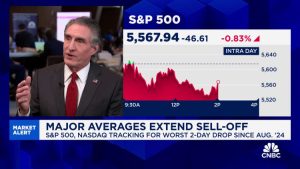One of the things that stops people from beginning to invest in UK shares is a lack of money. That’s understandable – but I actually think it’s possible to start investing without a lot of money. Here’s how I would begin investing in UK shares with just £100.
The benefits of starting small
It may seem as if starting with just a small amount of money is a disadvantage. But I actually see some benefits to starting investing on a smaller scale.
One Killer Stock For The Cybersecurity Surge
Cybersecurity is surging, with experts predicting that the cybersecurity market will reach US$366 billion by 2028 — more than double what it is today!
And with that kind of growth, this North American company stands to be the biggest winner.
Because their patented “self-repairing” technology is changing the cybersecurity landscape as we know it…
We think it has the potential to become the next famous tech success story. In fact, we think it could become as big… or even BIGGER than Shopify.
Click here to see how you can uncover the name of this North American stock that’s taking over Silicon Valley, one device at a time…
With only £100, I would pay attention to every penny. There isn’t the same ability to offset underperformance in one part of one’s portfolio with stronger results in another. That would help to focus my mind on learning about investing.
As in most fields of life, a lot of new investors make basic mistakes. For example, it can be tempting to invest in a very high yielding company without spotting that its cash flows are unlikely to support future dividends at the same level. Learning from these mistakes helps improve one’s performance as an investor. Making mistakes with £100 is a cheaper form of learning than with £20,000 in an ISA.
The role of fees and costs
When trading shares, there are almost always costs. These can be share dealing charges, taxes, duties, and the costs of maintaining a share dealing account.
Some of them are fixed or have a minimum size. So, proportionately, they could be much higher as a percentage of £100 than of £1,000 or £10,000. That means that if I was using only £100 to start investing, I would carefully look at the costs of the different share-dealing account options open to me. If I could minimise my costs, I would maximise the proportion of the £100 I could actually put to work in buying shares.
I’d start investing cautiously
£100 leaves very little room for error. So I would begin with a cautious approach to risk management.
One tool for risk management is diversification – but it can be expensive to buy different shares with £100. Instead, I would aim to get some diversification by investing in a fund or trust that held shares in different companies and sectors. This might be one that tracked the broad market or index of leading shares, such as the Vanguard FTSE 100 index Unit Trust. Or it could be an actively managed trust, such as the Scottish Mortgage Investment Trust.
Over the past year, those trusts have put on 26% and 45% respectively, at the time of writing today. So, if I had invested £100 a year ago, I would be sitting on a tidy profit already. Even allowing for costs, if I sold my shares I would hopefully still show a profit. But shares can fall in value as well as increase. Diversification does not protect against that – it simply reduces the risk of exposure to one particular share.
I’d start investing – and keep going
Any early success might encourage me to find different attractive UK shares in which I could invest. Having put £100 into UK shares, I’d also have some trading experience and know how. If I could set aside another £100 the following month, and £100 the month after that, I’d reduce the proportionate impact of my costs. I’d also build a bigger capital pile with which to invest, applying the lessons I had already learnt starting small.
Christopher Ruane has no position in any of the shares mentioned. The Motley Fool UK has no position in any of the shares mentioned. Views expressed on the companies mentioned in this article are those of the writer and therefore may differ from the official recommendations we make in our subscription services such as Share Advisor, Hidden Winners and Pro. Here at The Motley Fool we believe that considering a diverse range of insights makes us better investors.
This post was originally published on Motley Fool







